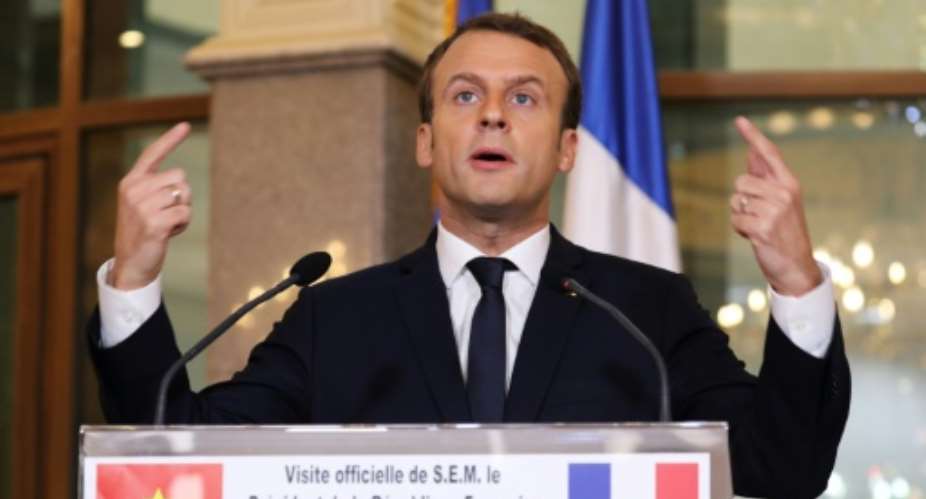President Emmanuel Macron on Tuesday kicked off his maiden African tour by vowing to declassify secret French files on Burkina Faso's assassinated leader, Thomas Sankara, hailed as a revolutionary hero in many parts of the continent.
The threat of terrorism has cast a shadow over Macron's swing through West Africa, with three civilians being wounded in an attempted grenade attack on French troops in Ouagadougou, the Burkinabe capital, shortly before his arrival late Monday.
"Two hooded individuals on a motorcycle threw a grenade towards a French army vehicle" as it made its way to a barracks housing French special forces, a security source told AFP on condition of anonymity.
The three-day trip aims to boost France's influence in West Africa, taking him from Burkina Faso -- bearing the brunt of jihadist attacks in the Sahel -- to a European-African summit in Ivory Coast and finally to Ghana, a former British colony.
After meeting Burkinabe President Roch Marc Christian Kaboré, Macron touched on one of the country's greatest traumas -- the killing of its revered leader Sankara, 30 years ago.
All French files on the event will be made available for Burkinabe investigators, Macron said.
"At present, except for documents which are classified and categorised as secret, the files are available and open to Burkinabe justice," Macron said.
"I have made a clear undertaking and I have just told President Kabore: these documents will now be declassified for Burkinabe justice, which will have access to all the documents on the Sankara affair."
Sankara, a charismatic young army captain dubbed "Africa's Che Guevara," was cut down in a hail of bullets on October 15, 1987 on his way to a special cabinet meeting.
The putsch brought Sankara's close friend Blaise Compaore to power. Compaore himself ruled Burkina Faso with a rod of iron until October 2014, when he was ousted by a popular uprising.
About a dozen people have been charged in connection with Sankara's assassination including soldiers from the presidential security unit.
Compaore, who is in exile in Ivory Coast, is the subject of an international arrest warrant over the killing.
Macron was to address university students, visit a school and meet members of the French community in Ouagadougou.
On Wednesday, he will attend the inauguration of a major solar power plant on the outskirts of Ouagadougou that has been built by a French company and partially funded by a French development agency.
Leftwing demonstrators erected a barricade and burned tyres on a road leading to the university ahead of Macron's speech there, as riot police were deployed.
Migration and security
Macron's advisers say his main message in the tour will be to stress a partnership of equals with Africa, based on education and entrepreneurship.
But regional security concerns will also be discussed, especially at a summit of the European Union and African Union on Wednesday and Thursday, which will bring together more than 80 leaders from the two continents.
European leaders are desperate to find ways to stem the flow of African migrants across the Mediterranean without leaving them to the mercy of traffickers in transit countries such as Libya, where they face torture, rape, and -- as a CNN report showed recently -- being sold into slavery.
Macron will also seek international backing for a new, five-nation African counter-terrorism force, which France hopes can eventually take over the fight against jihadist groups in the Sahel region.
Ouagadougou has suffered two recent terror attacks carried out by Islamist militants -- a shooting spree in January 2016 that left 20 dead and a similar assault by gunmen in August that killed 19.
French special forces have been present in the country since 2010 to help regional governments tackle jihadist violence in the Sahel, particularly in neighbouring Mali.
The disturbances near the university came after criticism of Macron in chatrooms on local social media.
Common criticisms include the lucrative contracts French companies sweep up in the region as well as Paris' historical support for African autocrats.





 Dumsor: Don't rush to demand timetable; the problem may be temporary — Atik Moha...
Dumsor: Don't rush to demand timetable; the problem may be temporary — Atik Moha...
 Space X Starlink’s satellite broadband approved in Ghana — NCA
Space X Starlink’s satellite broadband approved in Ghana — NCA
 2024 election will be decided on the grounds of the economy; choice of running m...
2024 election will be decided on the grounds of the economy; choice of running m...
 Dumsor: We're demanding less; just give us a timetable — Kwesi Pratt to ECG
Dumsor: We're demanding less; just give us a timetable — Kwesi Pratt to ECG
 Do I have to apologise for doing my security work, I won’t – Simon Osei-Mensah r...
Do I have to apologise for doing my security work, I won’t – Simon Osei-Mensah r...
 All my businesses have collapsed under Akufo-Addo — NDC Central regional chair
All my businesses have collapsed under Akufo-Addo — NDC Central regional chair
 Military, Prison Officers clash in Bawku, three injured
Military, Prison Officers clash in Bawku, three injured
 GRA-SML contract: MFWA files RTI request demanding KPMG report
GRA-SML contract: MFWA files RTI request demanding KPMG report
 Court threatens to call second accused to testify if NDC's Ofosu Ampofo fails to...
Court threatens to call second accused to testify if NDC's Ofosu Ampofo fails to...
 Family accuses hospital of medical negligence, extortion in death of 17-year-old...
Family accuses hospital of medical negligence, extortion in death of 17-year-old...
